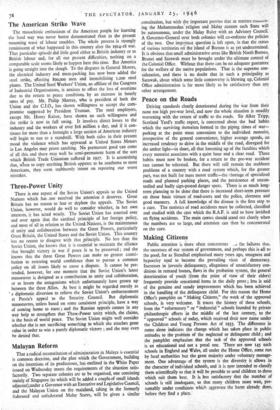Peace on the Roads
Driving standards clearly deteriorated during the liar from their none too high pre-war level, and now the whole situation is steadily worsening with the return of traffic to the roads. Sir Alker Tripp, Scotland Yard's traffic expert, is concerned about the bad habits which the surviving Motorists formed in the piping times of war— parking at the point most convenient to the individual motorist, irrespective of the general convenience, higher average speeds,- an increased tendency to drive in the middle of the road, disregard for the amber light—in short, all that loosening up of the faculties which every motorist associates with a quiet hour and a clear road. These habits must now be broken, for a return to the pre-war accident rate cannot be tolerated. But there will still remain the stubborn problems of a country with a road system which, for the greater part, was not built for mass motor traffic—the hortage of specialised roads and planned parking places, and the persistence of uncon- trolled and badly sign-posted danger spots. There is so much long- term planning to be done that there is increased short-term pressure on those basic virtues of road-users and the police, alertness and good manners. A full knowledge of the disease is the first step to a cure. The statistics of road accidents must be collected, classified and studied with the care which the R.A.F. is said to have lavished on flying accidents. The main causes should stand out clearly when the numbers are so large, and attention can then be concentrated on the cure.






























 Previous page
Previous page